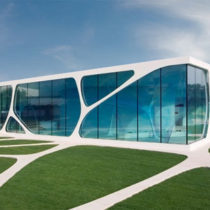- This topic has 1 reply, 3 voices, and was last updated 15 years, 2 months ago by
 Thomas J. Johnson.
Thomas J. Johnson.
-
AuthorPosts
-
December 16, 2010 at 6:06 am #166309
 Zach WatsonParticipant
Zach WatsonParticipantSo I hear the term Net-Zero in regards to a projects sustainability, but I have never truly heard what a net-zero project is. Any definition in the manner that you understand it would be appreciated.
Zach
December 16, 2010 at 4:31 pm #166314 Thomas J. JohnsonParticipant
Thomas J. JohnsonParticipantMy understanding of Net-Zero is that after all is said and done, the environmental impact of a construction project is zero. That means that all waste materials are recycled or composted and that carbon production is off-set (purchasing carbon credits, planting trees, etc). It might also mean land-banking, or setting aside land that will never be developed to offset the land you are developing.
Speaking of which, since this is a world economy these days, why not have international land banking. I.E. a developer in The United States could purchase 480acres in South America to offset the 480acre subdivision he’s developing in the US. This could be a very effective means of protecting the worlds resources (rain forests, grasslands, wetlands etc.) from development/forestry/agriculture/pollution. It would also be a good deal for the developer as land can be had for a lot less in other countries than it can here in the US. Hhhmmm… interesting…
December 16, 2010 at 4:42 pm #166313 Zach WatsonParticipant
Zach WatsonParticipantSo then does that mean that one has to account for all of the emissions that were used to created the building material and off-set them also? Then my biggest question in regards to that, how can one begin to calculate those types of figures?
December 16, 2010 at 5:34 pm #166312 Thomas J. JohnsonParticipant
Thomas J. JohnsonParticipantThat is my problem with claiming net-zero also. It’s literally impossible to calculate every input in a project. How far down the rabbit hole do you go?
Take a 2×4 – Guys went out and cut down a tree. Those guys ate food. The tools they used required energy to manufacture and operate. The tree, after being felled, was trucked to the mill where it was seasoned and ripped down to lumber. That lumber was loaded and shipped to a lumberyard where a fork-lift placed it on racks. A contractor drove to the lumber yard, selected the wood he wanted and drove it to the job site. On the way he filled up his truck with decomposed dinosaurs from the middle east and bought a cheeseburger whose beef was raised in South America on land that used to be rain forest but which was slashed and burned because it’s more profitable to raise beef for fast food than it is to have a rain forest, just sitting there being a rain forest. Back at the job site, 4 guys who drove to work as single occupancy commuters in trucks that get an average of 10mpg, help unload the wood. Then, using t-sqaures and circular saws made and imported from China, they cut joists for a deck. The deck is anchored in portland cement that comes from… and the screws and the joist hangers and… they all ate lunch at subway and smoked a pack of reds… and on and on and on…
I have strong Buddhist leanings and believe that everything is connected. When trying to define a net-zero project it becomes very difficult to define the inputs and outputs and how to off-set metrics. Then, you can also argue “energy is neither created nor destroyed” it only changes forms. Also, is there such a thing as net-zero? If you use x amount of carbon and a farmer uses no-till practices or you sequester carbon in a cave somewhere does it really offset your carbon usage? Wouldn’t it be better if the farmer practiced no-till, if the rainforest was preserved for the sake of preserving it, if people didn’t drive 10mpg trucks to work, if we didn’t use virgin forests for timber, if, if, if….
OK, ADD over and out…
December 16, 2010 at 5:45 pm #166311 Zach WatsonParticipant
Zach WatsonParticipantLOL that was an enjoyable post to read. I would have to say that I adhere to the same understanding when it comes to this net-zero concept. I got to thinking of it because of the City of Dreams Pavilion competition where everything in the project needs to be: biodegradable, compostable, recyclable, net-zero, blah, blah, blah. Don’t get me wrong, I’m all for products and items and that are nature friendly but I just don’t quite understand how one can claim these things.
Thanks for the response
December 16, 2010 at 7:10 pm #166310 BoilerplaterParticipant
BoilerplaterParticipantI thought it just meant that a building does not use more energy than it produces. For example, it might have a large solar array that offsets any other energy inputs in might need. It refers to the operating costs of the building, not the environmental impacts of the construction. It might be so well insulated that the mechanical systems it uses may be able to provide excess cpacity for other buidings or the electricity may go back into the grid.
-
AuthorPosts
- You must be logged in to reply to this topic.


